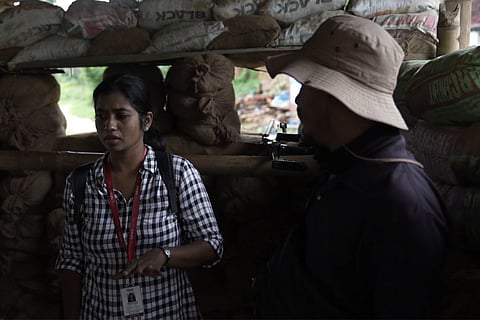

“Do you really want to come to my village? I can come and meet you where you’re staying,” Naoba* kept repeating whenever I called him from Imphal. We were batchmates during post-graduation at one of the central universities in a North Eastern state a decade ago. Naoba was that friend whose actions were coloured by Manipur in whatever he did. Who got emotional and angry when he spoke about the internal conflicts in his state. He would speak about the local Manipuri arrack Yu whenever we had beer and Chhang (another local drink) parties on weekends. He would fondly recall his small house in the valley, which is around 25 km from Imphal, the paddy fields on which his family cultivated Manipur special sticky rice. He invited me many times to Manipur, to visit his house, to sample Manipuri smoked pork, dry fish, and fermented bamboo. But now, 10 years later, when I finally visited Manipur he was hesitant to invite me to his village.
When I reached his village, Naoba was waiting for me on the road near his house. I could hardly recognise him. He was no longer the student who was my friend. His house was partially run-down while many other houses nearby had been burnt down. The fields were barren and only a very few people were walking around cautiously knowing that firing could start anytime. Naoba’s village is the end of the valley, from where the hills occupied by the Kukis begin. He lives in one of the most conflict-affected areas in a frontline village, where cross fire is frequent.
Naoba is a frontline volunteer for his village. He was on a shift to guard his village and fight if there was cross fire. That is what most village volunteers do. I heard him constantly communicating with others via a walkie-talkie. “This is not how I expected to meet you again. I cannot even take you home. There is nothing left,” he said. Showing me pictures of his kids on his phone, he said he had sent his wife and children to a faraway village where they stay in a relief camp.
He took me to a nearby bunker from where his friends keep a constant watch of the hills. I asked him where the sophisticated guns were. “We just have licensed guns. You should ask the state why they gave us so many licensed guns,” he chuckled.
“This is war and everything is fair in war,” Naoba told me as we went from bunker to bunker. “Just keep a little distance from me, I might stink. It’s been weeks since I showered, or eaten or slept properly,” he said. As we travelled, he kept calling ahead and informing others that we were coming. I asked whether he was warning them to hide something. Naoba just laughed.
“At least four volunteers remain in each bunker watching the hills. Another team takes their place after 8 to 10 hours. Even when not on shift, we are always vigilant and keep going around the village,” he said.
Naoba did little to conceal the hatred he felt for the other community. But he also painfully remembered how both the communities used to live in harmony in the village until a few months back. “We celebrated all the festivals together. Our children studied together, we worked together.”
“Guns have always been a part of our community, but I started using one only three months ago,” he said. He explained how firing would suddenly begin and continue for days. From their bunkers, the village volunteers can see similar bunkers belonging to the opposite side.
Talking about his five-year-old son’s education, Naoba said, “Considering the present situation in Manipur, I would rather teach him how to operate guns than send him to school. Let him learn ‘A for AK-47’ and ‘B for bunker’,” he laughed. He reflected that his Peace and Conflict Studies degree did not help him in real life.
When it was time to leave, he said, “Are you comfortable where you’re staying? I couldn’t offer you anything. If this ends and I am alive, I will come visit you in Kerala.”
Manipur Dispatches: Our reporters Prajwal Bhat, Haritha John and Bhuvan Malik are in Manipur to provide you with exclusive, in-depth ground reports that delve into the heart of the matter. If you believe that human rights violations in a distant land should be a topic of conversation in this part of India, support our intrepid truth-seeking mission. Contribute here.